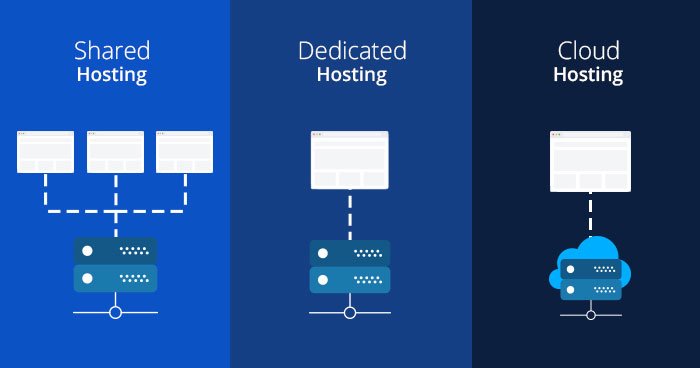When it comes to hosting a website, choosing the right type of web hosting is crucial for ensuring optimal performance, security, and scalability. The three main types of web hosting are shared hosting, Virtual Private Server (VPS) hosting, and dedicated hosting. Each of these options has its own set of features, benefits, and drawbacks. In this guide, we’ll compare shared, VPS, and dedicated hosting to help you determine which option best suits your needs.
1. Shared Hosting
a. Overview
Shared hosting is the most common and affordable hosting option. In a shared hosting environment, multiple websites share the same server resources, including CPU, RAM, and disk space. This setup is ideal for small websites, blogs, and personal portfolios.

b. Pros
- Cost-Effective: Shared hosting is typically the least expensive option, making it accessible for individuals and small businesses on a budget.
- Ease of Use: Most shared hosting plans come with user-friendly control panels and one-click installations, making it easy for beginners to manage their websites.
- Maintenance: The hosting provider handles server maintenance, updates, and security, allowing you to focus on your website.
c. Cons
- Limited Resources: Since you share server resources with other websites, performance can be affected during peak traffic times.
- Less Control: Shared hosting offers limited customization options, and you have less control over server settings and configurations.
- Potential for Security Risks: Sharing a server with other websites can expose your site to security vulnerabilities if other sites on the server are compromised.
2. VPS Hosting
a. Overview
VPS hosting provides a virtualized server environment where resources are dedicated to your website, even though multiple VPS instances run on the same physical server. This option offers a balance between shared and dedicated hosting, providing more control and better performance.
b. Pros
- Better Performance: VPS hosting offers more resources compared to shared hosting, resulting in improved website performance and faster loading times.
- More Control: You have greater control over server settings, configurations, and software installations. This is ideal for websites with specific technical requirements.
- Scalability: VPS plans can be easily upgraded to accommodate increased traffic and resource needs without significant downtime.
c. Cons
- Higher Cost: VPS hosting is more expensive than shared hosting, though it is generally more affordable than dedicated hosting.
- Technical Knowledge Required: Managing a VPS often requires a higher level of technical expertise compared to shared hosting. Some plans offer managed VPS services to alleviate this burden.
- Resource Limitations: While VPS hosting provides dedicated resources, it is still limited by the physical server’s total capacity.
3. Dedicated Hosting
a. Overview
Dedicated hosting provides an entire physical server solely for your website. This option offers the highest level of performance, control, and security. Dedicated hosting is best suited for large websites, e-commerce platforms, and high-traffic sites that require significant resources.
b. Pros
- Maximum Performance: With a dedicated server, you have access to all of the server’s resources, ensuring optimal performance and fast loading times.
- Complete Control: You have full control over server configurations, software installations, and security settings. This allows for extensive customization to meet specific needs.
- Enhanced Security: Dedicated hosting provides the highest level of security, as your server is not shared with other websites, reducing the risk of security breaches.
c. Cons
- High Cost: Dedicated hosting is the most expensive option, making it less accessible for small businesses and personal websites.
- Requires Technical Expertise: Managing a dedicated server often requires advanced technical knowledge or the assistance of a server administrator.
- Overkill for Small Sites: For smaller websites or those with modest traffic, dedicated hosting may be more than necessary, leading to unnecessary expenses.
How to Choose the Right Hosting Option for You
a. Assess Your Needs
- Traffic and Performance: Consider the expected traffic to your website and the level of performance required. Shared hosting may be sufficient for low-traffic sites, while VPS or dedicated hosting may be necessary for high-traffic sites.
- Budget: Determine your budget for web hosting. Shared hosting is the most cost-effective, while VPS and dedicated hosting come with higher price tags.
- Technical Expertise: Evaluate your technical knowledge and ability to manage server settings. Shared hosting is user-friendly, while VPS and dedicated hosting may require more technical skills.
b. Future Growth
- Scalability: Choose a hosting plan that can accommodate future growth. VPS hosting offers scalability options, while dedicated hosting provides ample resources for large-scale operations.
c. Security Requirements
- Security Needs: Assess the level of security required for your website. Dedicated hosting offers the highest level of security, while VPS hosting provides a good balance between security and performance.
Conclusion
Choosing between shared, VPS, and dedicated hosting depends on your website’s specific needs, budget, and technical expertise. Shared hosting is ideal for small websites and beginners, VPS hosting offers a middle ground with better performance and control, and dedicated hosting provides top-tier performance and security for large or high-traffic sites. By carefully assessing your requirements and considering the pros and cons of each hosting option, you can select the best plan to ensure your website’s success.



